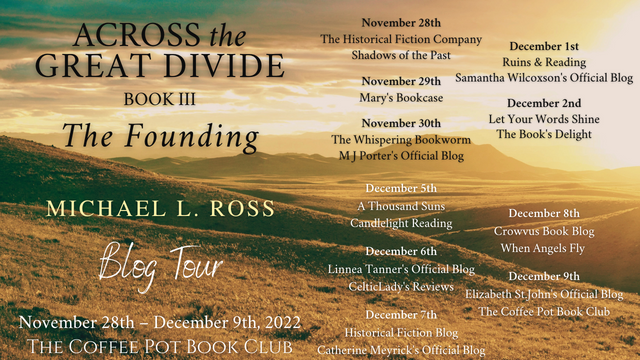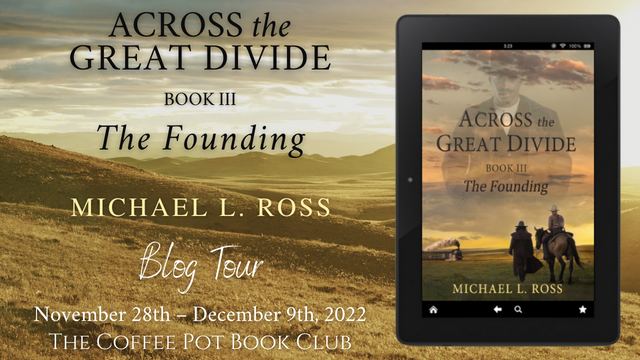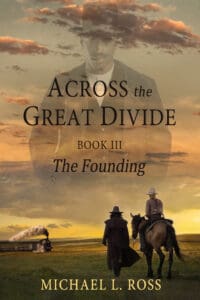
06 Dec The Founding Michael L. Ross #historicalfiction #biographicalfiction #BlogTour #TheCoffeePotBookClub @MichaelLRoss7 @cathiedunn
FEATURED AUTHOR: MICHAEL L. ROSS
I’m delighted to introduce Michael L. Ross as the featured author in The Coffee Pot Book Club Blog Tour being held between November 28th — December 9th, 2022. Michael L. Ross is the author of the Historical Fiction / Biographical Fiction, The Founding (Across the Great Divide: Book 3), which was released by HistoricalNovelsRUS on 6th December 2022 (480 pages).
Below are highlights and book trailer of The Founding, Deep, the author bio of Michael L. Ross, and an excerpt from his book.

To follow the blog tour, CLICK Schedule Page
HIGHLIGHTS: THE FOUNDING

The Founding
(Across the Great Divide: Book 3)
By Michael L. Ross
(Blurb)
Two men, two dreams, two new towns on the plains, and a railroad that will determine whether the towns—one black, one white—live or die.
Will Crump has survived the Civil War, Red Cloud’s War, and the loss of his love, but the search for peace and belonging still eludes him. From Colorado, famed Texas Ranger Charlie Goodnight lures Will to Texas, where he finds new love, but can a Civil War sharpshooter and a Quaker find a compromise to let their love survive? When Will has a chance to join in the founding of a new town, he risks everything—his savings, his family, and his life—but it will all be for nothing if the new railroad passes them by.
Luther has escaped slavery in Kentucky through Albinia, Will’s sister, only to find prejudice rearing its ugly head in Indiana. When the Black Codes are passed, he’s forced to leave and begin a new odyssey. Where can he and his family go to be truly free? Can they start a town owned by blacks, run by blacks, with no one to answer to? But their success will be dependent on the almighty railroad and overcoming bigotry to prove their town deserves the chance to thrive.
Will’s eldest sister, Julia, and her husband, Hiram, are watching the demise of their steamboat business and jump into railroads, but there’s a long black shadow in the form of Jay Gould, the robber baron who ruthlessly swallows any business he considers competition. Can Julia fight the rules against women in business, dodge Gould, and hold her marriage together?
The Founding tells the little-known story of the Exodusters and Nicodemus, the black town on the plains of Kansas, and the parallel story of Will’s founding of Lubbock, Texas, against the background of railroad expansion in America. A family reunited, new love discovered, the quest for freedom, the rise of two towns. In the end, can they reach Across the Great Divide? The Founding is the exciting conclusion to the series.
Praise for The Founding:
“Michael is an excellent storyteller and has done a wonderful job depicting Luther, and the other black characters in this book. He has done his homework and depicts many historical facts about Nicodemus in a most enlightening and creative way. It has been a pleasure working with someone who has made a concerted effort to get things right.”
~ Angela Bates
Nicodemus Descendant/Historian
Executive Director
The Nicodemus Historical Society and Museum
Buy Links:
Universal Link • Amazon UK • Amazon US • Amazon CA • Amazon AU
BOOK TRAILER: THE FOUNDING
AUTHOR BIO: MICHAEL L. ROSS

Michael Ross is a lover of history and great stories.
He’s a retired software engineer turned author, with three children, and five grandchildren, living in Newton, Kansas with his wife of 39 years. Michael graduated from Rice University and Portland State University with degrees in German and software engineering. He was part of an MBA program at Boston University.
Michael was born in Lubbock, Texas, and still loves Texas. He’s written short stories and technical articles in the past, as well as articles for the Texas Historical Society.
Across the Great Divide now has three novels in the series, “The Clouds of War”, “The Search”, and the conclusion, “The Founding”. “The Clouds of War” was an honorable mention for Coffee Pot Book of the Year in 2019, and an Amazon #1 best seller in three categories, along with making the Amazon top 100 paid, reviewed in Publisher’s Weekly. “The Search” won Coffee Pot Cover of the Year in 2020, and Coffee Pot Silver Medal for Book of the Year in 2020, as well as shortlisted for the Chanticleer International Book Laramie Award.
Social Media Links:
Website • Twitter • Facebook • LinkedIn • Instagram • Book Bub • Amazon Author Page • Goodreads
EXCERPT: THE FOUNDING
Excerpt 4:
Topeka, September 1876
Luther wiped the sweat away from his head. The stifling heat beat down, and the forge glowed. He couldn’t imagine autumn around the corner. Sighing, he picked up a hammer and worked on flattening the iron that was to be a mechanical corn planter. He’d heard about the design and had written to the patent office to get plans and a license. He was surprised to find the patent holder was another black man from forty years prior. They sure never had machines like this when he was at the Clay plantation in Kentucky. He turned the iron, pounded two more strokes, and saw a man in the doorway to the shop. He was about done with that piece anyway, so he plunged it into the water to cool, laid down the hammer, and cleaned his hands on his apron.
Luther walked over to the doorway, and in better light, he could see the man was black, with a triangular brand mark on his right cheek. The man wore a long black coat, even in the heat, a slouch hat, and a clerical collar.
“Afternoon, Reverend. What can I do for you?”
“I’m Reverend Simon Roundtree. Someone told me that you and your family here know most of the black folks around and that you’re originally from Lexington, Kentucky.”
Luther frowned and moved back toward the forge. “Somebody talks too much.”
Luther picked up the hammer again and heated an iron bar in the forge.
“Is it true?”
Luther turned toward him. “Yes, sir, it is. But I don’t much like talking about the slave days. I know we are free now, but I still look over my shoulder, ’specially round white folks. I have been betrayed by black folks too. My sister died because of it. Makes a man wary.”
Simon pointed to his cheek. “Think I don’t know? I understand that. But what if I told you that you got a chance to come to the Promised Land, to freedom, own your land, answer to nobody?”
Luther set the hammer down again. “I’m listening.”
“I’m partners with a white man named William Hill. We’re platting out a town in western Kansas. A colored town. I’m from Dry Lick, Kentucky, north of Lexington and Georgetown. I pastor the Mount Olivet church there.”
Luther stroked his chin. “How many people has this town got?”
Simon said, “Well, ain’t got any right now.”
“And where is this town with nobody?”
“Almost fifty miles north of Fort Hays. And before you ask, thirty-five miles north of Ellis and the railroad. But the railroad is coming.”
“I been out there. I worked the railroad. Ain’t nothin’ out there but a hell hole with jackrabbits in the summer and frozen wasteland in the winter.”
“There may be nothin’ there now, but think—a black town! We could start everything from scratch. Real freedom! And everything will change when the railroad comes through. Businesses, easy shipping for crops, and the land is good.”
“Mm-hmm. I’ve wanted somethin’ like that, but it sounds like freedom to starve. I hear you, but I can’t see how it could succeed. For the railroad to come, you gotta raise money and pay for building a depot. There are no trees for wood. That’s gonna take a lot of people.”
“That’s where you come in. I have families back in Lexington that will jump at the chance to get land. But they’ll have to come on the train, not by wagon. They won’t be able to bring much. A few will bring horses and plows, but not many. They’ll need tools made—plows, planters, all kinds of farm equipment, just like what you’re making there.”
Luther chuckled. “And I s’pose these black families are flowing with cash to pay for all these things.”
“No, no, they ain’t. But God will provide, just like when Moses led the Israelites to the Promised Land.”
Luther raised an eyebrow. “I seem to recall those Israelites near died of thirst and starvation, not to mention Egyptians. I read the Good Book. And I’ve fought the Cheyenne.”
“Sure, the Israelites had to fight against a whole bunch of kings, but ain’t we been fighting our whole lives? Fight the white man to keep your family together, to learn to read—that’s how I got this!” He pointed at the brand on his face. “White man decided I got too smart for my own good, or at least for his good. Fighting for food, the right to walk down the street without someone saying, ‘Hey, black boy, pick that up.’ We didn’t ask to come to this country, but we’re here. We’re full citizens by the law. Now we just got to make folks respect us and show what we can do. This black man gonna get free and work to enjoy all the good Lord gives. What about you?”
Luther considered, pounding a few strokes. “Folks here in Topeka sure don’t respect a black man. Let’s say me and my family go with you. What about this white man, this Hill fella? How do you know he ain’t gonna just steal you blind, leave you in the wilderness with nothin’?”
“I do have papers for the land. Each family pays Hill five dollars for the land and opportunity. It’s all the white folks had when they came to America and more than we’ve had in a century. If you come back with me to Lexington, just for a time, you can help convince families to come. You’ve been around there. You know what it’s like. You can testify.”
“Let me think it over. I’ll talk to Ruth and my in-laws. My father-in-law is a blacksmith too Getting a little old, but he taught me everything I know. Come by the house for supper tomorrow.” Luther picked up a pencil and scribbled the address, handing it to Simon. “They can meet you, and we can decide.”



Cathie Dunn
Posted at 12:32h, 06 DecemberThanks very much for hosting Michael Ross today. x
Linnea Tanner
Posted at 15:30h, 12 DecemberHi Cathie–It was my pleasure to host Michael L. Ross and feature his book, “The Founding.”